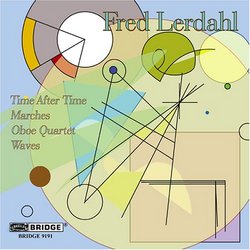| All Artists: Fred Lerdahl, Jeffrey Milarsky, Antares, La Fenice, Orpheus Chamber Orchestra Columbia Sinfonietta Title: Fred Lerdahl: Time after Time; Marches; Oboe Quartet; Waves Members Wishing: 0 Total Copies: 0 Label: Bridge Records, Inc. Original Release Date: 5/1/2006 Release Date: 5/1/2006 Genre: Classical Styles: Chamber Music, Historical Periods, Classical (c.1770-1830) Number of Discs: 1 SwapaCD Credits: 1 UPC: 090404919121 |
Search - Fred Lerdahl, Jeffrey Milarsky, Antares, La Fenice, Orpheus Chamber Orchestra Columbia Sinfonietta :: Fred Lerdahl: Time after Time; Marches; Oboe Quartet; Waves
 | Fred Lerdahl, Jeffrey Milarsky, Antares, La Fenice, Orpheus Chamber Orchestra Columbia Sinfonietta Fred Lerdahl: Time after Time; Marches; Oboe Quartet; Waves Genre: Classical
Fred Lerdahl is one of the least known among ?major? American composers. Lerdahl?s music is greatly admired by cognoscenti, and his theoretical writings are among the most important of the latter 20th century, but his musi... more » |
Larger Image |
CD Details
Synopsis
Product Description
Fred Lerdahl is one of the least known among ?major? American composers. Lerdahl?s music is greatly admired by cognoscenti, and his theoretical writings are among the most important of the latter 20th century, but his music remains less known to the general public, perhaps because of its non-doctrinaire stance. A Lerdahl composition might at any moment be tonal or atonal, it might luxuriate in Lerdahl?s rich melodic and harmonic gifts, or it might make reference to various musics of our past. Pulitzer prize-winning composer Paul Moravec writes that: ?The deep, fresh, inspired music of Fred Lerdahl is a beacon for listeners making their way forward through the millenium?s strange and wonderful landscape of the imagination. Organic images express the way in which Lerdahl?s music seems so right as it unfolds in time, giving the impression of inexorability.? Time After Time, a Pulitzer prize finalist, is for the familiar ?Pierrot plus percussion? formation. In two movements, the eighteen and a half minute composition employs spiral forms, in which simple ideas become elaborated and more complex with each cycle. Marches, for clarinet, violin, cello, and piano is a phantasmagoria of over-laid march-like ideas. One can feel the presence of Sousa and Mahler, lurking in the wings as Lerdahl creates an overall mood that veers between humor and fervent instrumental brilliance. Lerdahl's Oboe Quartet was composed for La Fenice, the ensemble that performs it here. Led by the superb oboist Peggy Pearson, the quartet integrates the oboe into the ensemble in a single 13 minute movement whose overall mood is playful with occasional dark undertones. Waves for chamber orchestra simply must be heard to be believed. Given a stunningly controlled reading by the conductor-less Orpheus Chamber Orchestra, this recording is a re-mastered release of the out-of-print Deutsche Grammophon recording.

 Track Listings (5) - Disc #1
Track Listings (5) - Disc #1